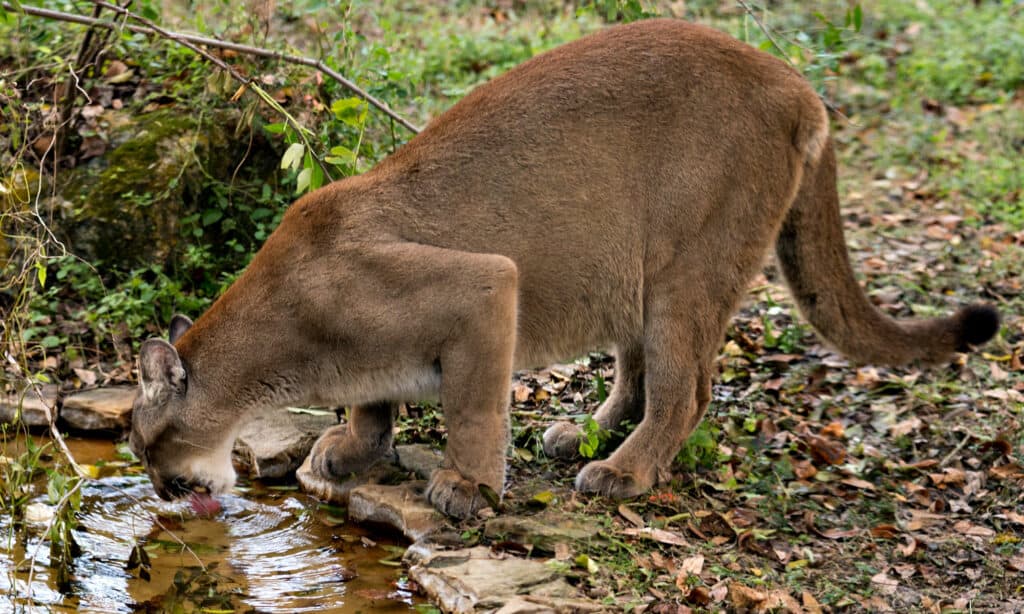Mountain lions live in the western half of the U.S. and in Florida. They used to live all over the U.S., but their range is now limited to the western states after decades of hunting and habitat loss. Mountain lions are also known by the names cougar, puma, and panther. The isolated population in Florida is called the Florida panthers. Whatever name they go by, they share the same characteristics of being solitary, stealthy large cats that are near the top of the food chain.
So how did they disappear from the eastern U.S.? Are they at risk of disappearing from the western U.S. as well? Can you hunt mountain lions? Should you? Let’s find out the pros and cons.
What are mountain lions?

Mountain lions are large cats that live in North and South America.
©Unknown/Shutterstock.com
Mountain lions (Puma concolor) are large, wild cats that can live in various habitats besides mountains. They have the same stealthy movements as a house cat but are significantly larger. Mountain lions are around 4 feet long with a two-and-a-half foot tail and can stand 24-30 inches tall at the shoulder. The average male weighs around 135 pounds, with females being a bit smaller. Their short fur is buff/tan colored with dark brown ears and tip of tail. They are quite adaptable and have a varied diet which is one reason they have a large range from Canada down to the southern tip of Argentina.
Where can you hunt mountain lions?
The following states allow mountain lion hunting. Each state has regulations regarding how many permits are offered and how long the hunting season is. Mountain lion hunting is allowed in:
- Arizona
- Colorado
- Idaho
- Montana
- Nebraska
- Nevada
- New Mexico
- North Dakota
- Oregon
- South Dakota
- Texas
- Utah
- Washington
- Wyoming
Where can you NOT hunt mountain lions?
California specifically bans mountain lion hunting under the California Wildlife Protection Act of 1990 (Proposition 117). It has legally classified the mountain lion as a “specially protected mammal.” Other states do not have any mountain lions. Here are the states where it is either illegal to hunt mountain lions or mountain lions no longer exist:
- Alabama
- Alaska
- California (has breeding populations of mountain lions)
- Connecticut
- Delaware
- Florida (has one breeding population of a subspecies of the mountain lion (Puma concolor coryi))
- Georgia
- Hawaii
- Illinois
- Indiana
- Iowa
- Kansas
- Kentucky
- Louisiana
- Maine
- Maryland
- Massachusetts
- Michigan
- Minnesota
- Mississippi
- Missouri
- New Hampshire
- New Jersey
- New York
- North Carolina
- Ohio
- Oklahoma
- Pennsylvania
- Rhode Island
- South Carolina
- Tennessee
- Vermont
- Virginia
- West Virginia
- Wisconsin
When is mountain lion hunting season?

In the states that allow mountain lion hunting, the season varies from state to state.
©iStock.com/Rejean Bedard
Mountain lion hunting season varies from state to state and sometimes by region within each state. Some states will limit the number that can be taken and close the season once the quota has been met. Other states like Arizona and South Dakota have an open season all year. Check with each state to determine the regulations as they vary and change frequently.
The “hunt or not hunt” debate?

There is an ongoing debate about whether people should be allowed to hunt animals.
©PRESSLAB/Shutterstock.com
There is an ongoing debate about whether humans should hunt other animals. Some argue that humans should play a role in population management. For example, hunting white-tailed deer keeps the deer population in check. If left unchecked, they would overpopulate an area and compete for food, and thousands would die. Others suggest humans should not hunt other animals. The deer example suggests that starvation and diseases are Mother Nature’s way of controlling populations. The pro-hunting camp suggests that not hunting deer is a waste of resources because we humans can harvest the deer for food. The “hunt or don’t hunt” debate will not be solved here, but let’s look at the debate over mountain lions.
Should you hunt mountain lions?
Mountain lions in the eastern U.S. were overhunted; now, they no longer exist there. We do not want that to happen in the western U.S. But if you are a rancher and find several herds of cattle killed by mountain lions every month, then you might want to hunt the mountain lions, but should you? Some people argue that hunting mountain lions to protect livestock like cattle and sheep is warranted. Other site statistics show that the number of livestock killed by mountain lions is extremely low compared to the total number of livestock. A century ago, the main reason mountain lions were hunted was that they preyed on livestock. Now, some hunters kill mountain lions to protect their livestock, but there are also hunters that hunt for sport. More people are opposed to hunting for sport vs. protection, but the debate continues.
How many mountain lions are hunted each year?

Arizona recorded 350 mountain lion kills in the 2019-2020 hunting season.
©iStock.com/SandmanXX
A hundred years ago, we did not have the same wildlife management agencies that we do today. Each state monitors the number of mountain lions (as well as many other species) and decides on the level of permitted hunting. In South Dakota, for example, they put a cap at 60 total mountain lions, but in 2019, only 21 were killed. Nebraska opened its first season in 2019 with a cap of 8, but only one was filled. In other states like Arizona, where there is a much larger population of mountain lions, there were 350 mountain lions killed in the 2019-2020 season.
Do mountain lions kill pets?
Mountain lions can kill pets like dogs and cats. There are certain areas where mountain lion habitats have been confined to areas that are close to residential homes. These are the areas where pet owners need to be very cautious.
Are mountain lions dangerous or deadly?
Mountain lions can kill people, but it is extremely rare. They are solitary animals that are more likely to avoid humans and/or run away if confronted. However, there have been some mountain lion-human conflicts that have turned fatal. A woman that was hiking on the Hunchback Trail on Mount Hood in Oregon went missing back in late August of 2018. Authorities found her body a few days later at the bottom of an embankment and determined that she had been attacked by a mountain lion. This was the first-ever fatal attack by a mountain lion in Oregon.
Now that you know where you can hunt mountain lions, you will have to do your research to decide if you want to or should. If you come across one on a hiking trail, you do have the right to protect yourself by killing it. But in most cases, mountain lions will run away and not cause trouble.
The photo featured at the top of this post is © iStock.com/gatito33
Thank you for reading! Have some feedback for us? Contact the AZ Animals editorial team.







